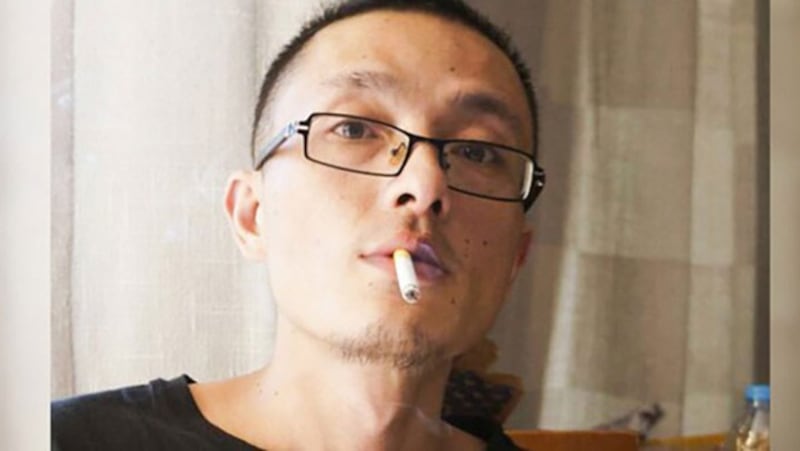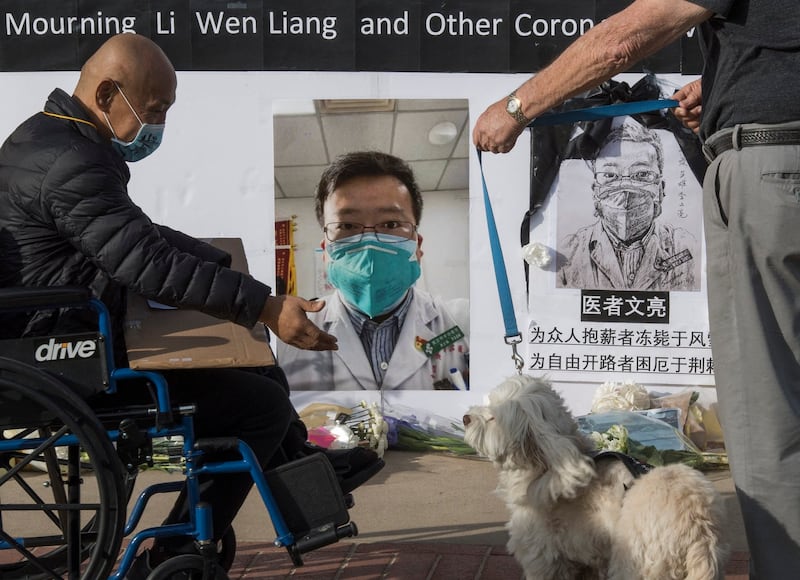Wuhan was Ground Zero in the emergence of the COVID-19 pandemic, the first city in the world to undergo a total lockdown in early 2020.
Yet like citizens across China, residents of the city have been unable to see a new documentary about their experiences during that crisis without risking punishment to circumvent the Great Firewall of government censorship.
Using footage smuggled out of China by citizen journalist Lu Yuyu, who fled to Canada after serving a four-year jail term for building a database of public protests, "Wuhan Lockdown" also compiles frontline reporting from the early days of the pandemic by citizen journalists, many of whom are now behind bars, held incommunicado or in exile.
While the project was conceived by the film's executive producer and former 1989 student leader Wang Dan, it was financed, shot, researched, compiled and edited by a huge team of writers, businesspeople, photographers, music producers and other volunteers, who wrote their own anti-censorship software to get around the Great Firewall.
"There were two different anti-censorship systems overseas at the time, which would automatically collect relevant reports from various media and form a very detailed picture, from which we learned a lot of information," a producer who asked to remain anonymous for fear of reprisals told RFA in a recent interview.
"We also conducted research and verification, then collected videos, pictures and text from citizens’ protests, and investigated the number of deaths from Wuhan pneumonia," they said, using an early term for COVID-19 that was current in China at the start of the pandemic.

"Lu Yuyu played a big role in that process," the producer said. "Our documentary was very long starting out ... but we had to condense it, so we could only touch on the role played by some characters."
A resident of Wuhan who gave only the surname Li for fear of reprisals said he would love to watch "Wuhan Lockdown" but would have to use illegal circumvention software to "climb the Great Firewall" to see it from China.
Don’t forget
Wang Dan said he started to coordinate the project a year ago to remind people of that traumatic part of China's recent history.
"It has been more than a year since the three-year zero-COVID restrictions, and production began more than a year ago," said Wang, who writes commentaries for RFA Mandarin.
"We were worried that people would start to forget about this human tragedy, so we wanted to revisit it after some time had elapsed."
The film sees the early days of the pandemic in Wuhan and its impact on the city's 10 million residents through the eyes of people whose voices cut through attempts by local Communist Party officials to cover up the nature of the airborne, highly transmissible disease as it ripped through an unprepared and unvaccinated population.

The film starts with attempts by whistleblowing Wuhan doctors Li Wenliang and Ai Fen to warn people about the wave of mysterious infections sweeping the city's hospitals that appeared to be remarkably similar to the SARS outbreak of 2003.
It showcases the work of now-jailed citizen reporters like Fang Bin, Zhang Zhan and Fang Bin, as well as exiled journalist Kcriss Li, who checked into hotel rooms in the city to report from its streets, hospitals and rapidly built quarantine centers while evading attempts by state security police to catch up with them.
Yet much of the material was collected before the idea for a film took off.
"We started collecting evidence of the Wuhan authorities' censorship of speech [about the outbreak] on social media," the production team member said. "We hadn't thought of making it into a documentary at first, but then we started seeing very detailed videos after the Wuhan lockdown ended, with very rich content about civil resistance, censorship and so on."
"It was like something out of the novel 1984," they said, referencing George Orwell's dystopian work about life under the totalitarian surveillance of the fictional Big Brother. "That's why Wang Dan's team decided to make a documentary out of it."
Escape from China
Lu made an initial edit of the film while he was still in China, before fleeing China via the mountainous border areas of the southwestern region of Guangxi where he crossed into neighboring Laos and, eventually, Thailand.
He was granted political asylum by the Canadian government in September 2023, and brought his film with him.
Most of the production team have now left China due to fears for their personal safety and those of their loved ones, the team member said.
The film also touches on official attempts to cover up the initial death toll as the novel coronavirus infected the people of Wuhan.
Authorities claimed that only 2,531 people died, but nobody believes that number. Estimates at the time based on the number of cremations carried out by the city's seven crematoria suggested that tens of thousands died.

A Wuhan resident who gave only the surname Zhou for fear of reprisals said she visited the Huanan Seafood Market on Dec. 31, 2019, in a bid to find out more about the mystery disease.
"The people there selling seafood told me that it was a rumor, that there was no such thing," Zhou said. "They said the rumors had ruined business."
She said her family has been ruined by the pandemic and the subsequent three-year zero-COVID restrictions, which were lifted in December 2022 following nationwide protests.
"I've been so sad over the past four years," she said. "The pandemic has wiped out all of our family's money."
"Wages haven't increased, while prices have skyrocketed," Zhou said. "It makes it very hard for ordinary people to get by."
Fellow Wuhan resident Li said people are still getting infected with mutated strains of COVID-19, and that he just wants it all to stop.
"They are still playing announcements for people to wear masks on the bus," Li said. "People are still wearing masks on the streets."
"Wuhan Lockdown" premiered globally on Dec. 30, with screenings in democratic Taiwan, the Hague, Toronto, Los Angeles and New York, as well as Japan and Germany, according to its publicity trailer on YouTube.
Translated by Luisetta Mudie. Edited by Malcolm Foster.
